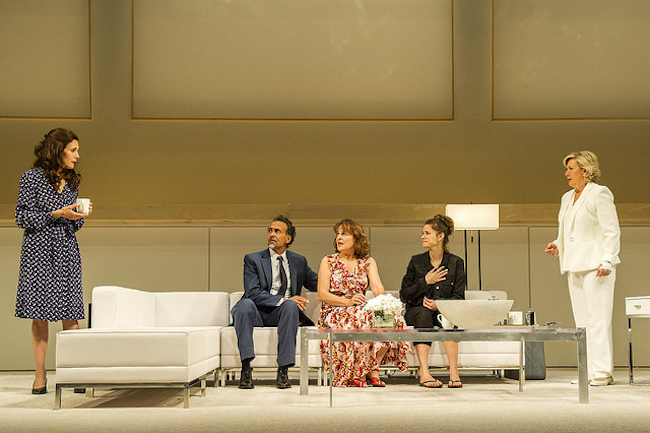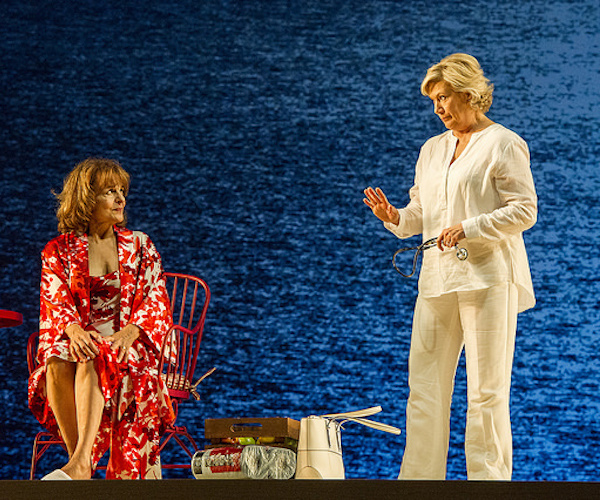Theater Review: A Superb “Clean House” at The Williamstown Theatre Festival
This is a masterful production of Sarah Ruhl’s sparkling update of Commedia dell’arte.
The Clean House by Sarah Ruhl. Directed by Rebecca Taichman. Staged by the Williamstown Theatre Festival on its MainStage, Williamstown, MA through July 29.

(L to R): Jessica Hecht (Virginia), Bernard White (Charles), Priscilla Lopez (Ana), Guenia Lemos (Matilde), and Jayne Atkinson (Lane) in the Williamstown Theatre Festival production of “The Clean House.” Photo: Daniel Rader.
By Helen Epstein
Since the beginning of this century, playwright Sarah Ruhl has been entertaining theatergoers with her absurdist comedies, scripts that are firmly grounded in realities (past and present), though built around strikingly wacky concepts. Ruhl’s Dead Man’s Cell Phone (2007) remains vivid in my mind even though I reviewed it for The Arts Fuse in 2009; in it, a man dies, but his cell phone does not. (At that time 275 million cell phones were being used in the United States.) Ruhl’s genius in that script and in her next play, In the Next Room or The Vibrator Play (2009), was to take an ‘essential’ techno-cultural instrument and make use of it — as a symbol of social transformation as well as a catalyst for quirky dramatic action.
In The Clean House, Ruhl starts out by positing the contemporary (personal, professional, philosophical, and cross-cultural) relationship between a woman doctor and her cleaning lady. She then spins a farcical tale that looks at betrayal, the blinders of privilege, the differences between the professional and working class, love, sex, marriage, sibling relations, relations between four very different kinds of women and one man, various perceptions of humor, the lies we tell ourselves to justify what we do, and God knows what else.
The play opens in the suburban, all-white living room of a successful doctor couple. (In the program, the location is described as “A metaphysical Connecticut or a house that is not far from the city and not far from the sea.”) The husband is an always-busy, eminent, and charismatic cancer surgeon; his wife, Lane, is not as successful. They employ a Brazilian maid named Matilde who is dressed in mourning and hates cleaning. Matilde quickly figures out that Lane’s husband has fallen in love with a patient when, in the company of the wife’s sister, Virginia, she happens upon a pair of bright red bikini panties in the couple’s laundry. I will not describe the plot twists, hilariously honest monologues, and vividly staged flights of fancy that follow – suffice it to say that they are fabulously theatrical as well as visually and intellectually satisfying.
Ruhl started out wanting to be a poet and her dialogue reflects this ambition — her lines can be both lyrical and dramatically effective. “It has been such a hard month,” Lane confesses in her opening monologue, “My cleaning lady got depressed and stopped cleaning my house….I didn’t go to medical school to clean my own house.” Assessing the situation, Virginia takes on the task.
Lane’s sister, who studied Greek Literature at Bryn Mawr, acknowledges that her sibling is “a doctor in an important hospital,“ but wonders how one hospital can be more important than another. And she is somewhat baffled that Lane has “given up the privilege of cleaning her own house.” As for the cleaning lady, she is more interested in coming up with the perfect joke than in maintaining a clean house. “If more women knew more jokes,” she says, “there would be more justice in the world.”
There is, of course, little justice on hand for any of the characters in the play — but there is plenty of laughter.
The Williamstown Theatre Festival has placed the sparkling wit of Ruhl’s text in the hands of a director, Rebecca Taichman, who is deeply familiar with the impish subtleties of the playwright’s work. Taichman has also chosen an extremely talented cast and a stellar design team. They make full use of the WTF’s massive technical resources; the production’s jokes extend from the verbal to the physical, the visual to the musical.
Guenia Lemos is superb as the maid whose name Lane has a lot of trouble pronouncing. The worker may be dressed in black, but she is determined to be funny. The actress takes on the classical servant role, which in most contemporary dramas been relegated to caricature (or silence) and endows it with idiosyncratic vim and vigor.
The masterful Jayne Atkinson – clad in elegant white pants and top, a helmet of blond hair on her head, imbues the character of Lane with a Clintonesque competence. She also exudes an obtuse obnoxiousness that seems to channel an Alec Baldwin arrogance when she delivers lines such as “I don’t want an interesting person to clean my house….I want you to do all the things I want you to do without having to tell you what to do.” She is totally convincing as a first-world professional — a little short on empathy for anyone but herself.
Jessica Hecht steals her scenes as Virginia, the unappreciated mousy younger sister who is as intelligent as Lane but far more perceptive about other people. For reasons that are left unexplored, she has no job and no children. She likes cleaning because it clears her head. “If you do not clean, how can you measure the progress in your life?” Hecht asks, with flawless comedic timing.
Bernard White, the sole male in the company, adds admirable complexity to the figure of Charles, whose character comes dangerously close to caricature. The set-up: this is a charismatic surgeon falls in love with his patient before performing a mastectomy on her. The actor skates along the edge of realism and parody with great ease.

(L to R): Priscilla Lopez (Ana) and Jayne Atkinson (Lane) in the Williamstown Theatre Festival production of “The Clean House.” Photo: Daniel Rader.
The most pleasant surprise in the WTF production for me was to watch Priscilla Lopez. the original Diana Morales in A Chorus Line. She is quite fine as the Argentinian painter Ana, a gracious 67-year-old Other Woman.
The WTF set is spectacular. It initially functions as a signboard on which Ruhl’s wry introductions, interpretations, and summaries of the action appear as super-titles in the manner of Jenny Holzer’s text paintings: “VIRGINIA AND LANE EXPERIENCE A PRIMAL MOMENT WHEN THEY ARE SEVEN AND NINE YEARS OLD” says one. “LANE MAKES A HOUSECALL TO HER HUSBAND’S SOUL-MATE” reads another. It would be spoiling the visuals to go into any detail about how the set splits, showing us doings far away from the all-white living room,. Scenic Designer Riccardo Hernandez, Costume Designer Anita Yavich, Lighting Designer Ben Stanton, and Sound Designer Andre Pluess all deserve high praise.
Taichman has put together a masterful production of Ruhl’s update of Commedia dell’arte; the evening manages to supply amusement along with the kinds of psychological insight that one expects from serious drama. There is something cleansing about the high spirits of The Clean House in these low and difficult times.
Helen Epstein reviews books and theater for artsfuse. She is the author of Joe Papp: An American Life and nine other books. Her work can be found at Plunkett Lake Press.
Tagged: Culture Vulture, Rebecca Taichman, Sarah-Ruhl, The-clean-house

